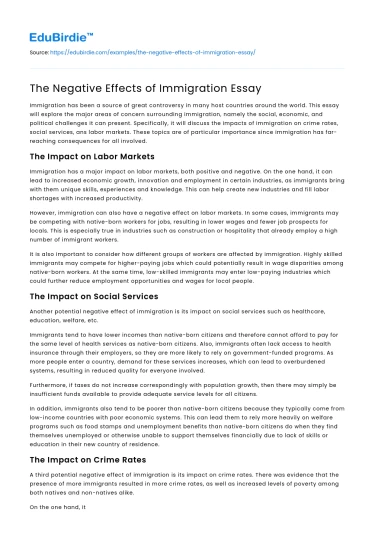Immigration has been a source of great controversy in many host countries around the world. This essay will explore the major areas of concern surrounding immigration, namely the social, economic, and political challenges it can present. Specifically, it will discuss the impacts of immigration on crime rates, social services, ans labor markets. These topics are of particular importance since immigration has far-reaching consequences for all involved.
The Impact on Labor Markets
Immigration has a major impact on labor markets, both positive and negative. On the one hand, it can lead to increased economic growth, innovation and employment in certain industries, as immigrants bring with them unique skills, experiences and knowledge. This can help create new industries and fill labor shortages with increased productivity.
Save your time!
We can take care of your essay
- Proper editing and formatting
- Free revision, title page, and bibliography
- Flexible prices and money-back guarantee
However, immigration can also have a negative effect on labor markets. In some cases, immigrants may be competing with native-born workers for jobs, resulting in lower wages and fewer job prospects for locals. This is especially true in industries such as construction or hospitality that already employ a high number of immigrant workers.
It is also important to consider how different groups of workers are affected by immigration. Highly skilled immigrants may compete for higher-paying jobs which could potentially result in wage disparities among native-born workers. At the same time, low-skilled immigrants may enter low-paying industries which could further reduce employment opportunities and wages for local people.
The Impact on Social Services
Another potential negative effect of immigration is its impact on social services such as healthcare, education, welfare, etc.
Immigrants tend to have lower incomes than native-born citizens and therefore cannot afford to pay for the same level of health services as native-born citizens. Also, immigrants often lack access to health insurance through their employers, so they are more likely to rely on government-funded programs. As more people enter a country, demand for these services increases, which can lead to overburdened systems, resulting in reduced quality for everyone involved.
Furthermore, if taxes do not increase correspondingly with population growth, then there may simply be insufficient funds available to provide adequate service levels for all citizens.
In addition, immigrants also tend to be poorer than native-born citizens because they typically come from low-income countries with poor economic systems. This can lead them to rely more heavily on welfare programs such as food stamps and unemployment benefits than native-born citizens do when they find themselves unemployed or otherwise unable to support themselves financially due to lack of skills or education in their new country of residence.
The Impact on Crime Rates
A third potential negative effect of immigration is its impact on crime rates. There was evidence that the presence of more immigrants resulted in more crime rates, as well as increased levels of poverty among both natives and non-natives alike.
On the one hand, it is argued that immigrants, especially those who enter without the proper documentation, may be more likely to engage in criminal activity due to their marginalized position in society. Furthermore, language barriers, cultural disconnect, and limited access to education and jobs can increase their vulnerability to such behavior.
However, some recent research has shown that immigrants are no more likely than native citizens to commit crimes, it has also shown that certain types of crime (e.g., drug trafficking) are disproportionately associated with immigrant communities due to poverty or other factors. This can lead to increased fear among native populations and further tensions between different groups within society.
Conclusion
Immigration has long been a complex issue, but it is one that must be addressed in order for any society to thrive and progress into the future.
There is no denying that immigration can have both positive and negative effects on any country’s economy, depending on various factors such as pre-existing economic conditions or cultural values held by its citizens regarding foreign nationals entering their borders legally or illegally.
Nevertheless, research strongly suggests that there can indeed be negative effects associated with large-scale immigration such as impacts on labor markets, social services, and crime rates, but these effects can also be mitigated through proper planning and policy implementation.
Understanding this better is key to making informed decisions about how best to move forward regarding immigration policies, both now and in the future.






 Stuck on your essay?
Stuck on your essay?

